For many, college is a time for exploration, trying new things, deciding which career path to pursue, and even starting a business. If you’re considering launching an enterprise, it’s essential to weigh both the risks and rewards.
This guide, developed by our experts, explains how to start a small business as a student. It covers the differences between business and entrepreneurship, lists the best startup ideas, walks you through creating a plan, and contains helpful business tips for students. In the final section, there is a collection of valuable resources that can help anyone become a star entrepreneur.
🎭 The Risks and Rewards of Starting Your Own Business
If you are still unsure whether to pursue the path of entrepreneurship, it is a good idea to weigh all the pros and cons. Opening your own business as a student undeniably has its risks. However, in time, it can also yield plenty of rewards.
Before we delve into those, let us examine the difference between a business and an entrepreneurship:
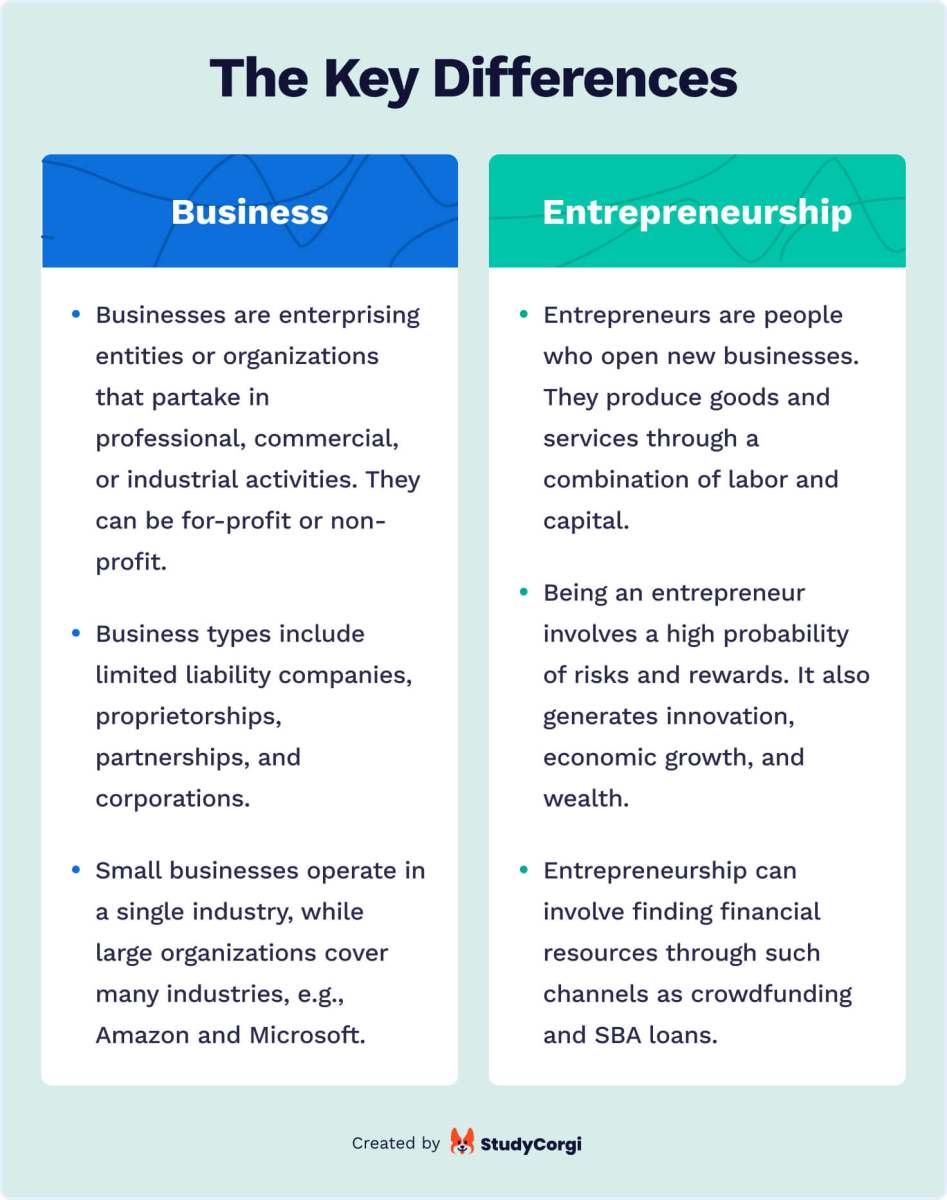
Risks
Starting a new venture can put people at risk of failure and often involves barriers that must be overcome. The same is true for other things, such as becoming a professional musician or an e-sports player. People who want to start a business have much to consider, including:
👎 The time it takes to manage. Regardless of how well you organize your business, many hours must be dedicated to managing it.
👎 Big responsibility. Business owners are responsible for the macro processes within their enterprises. Success or failure is entirely in the owner’s hands. They must ensure that their business has enough financial and material resources.
👎 Time constraints. Student entrepreneurs have to balance their academic and business responsibilities. Those who want to create their own enterprise should prepare to dedicate most of their waking hours to these activities.
👎 Multiple contributing factors. These include market trends, financial analytics, customer relations, etc. Business owners always need to stay in touch with the latest industry trends.
👎 High expenses. Building a business from the ground up involves many expenses, without the promise of fast earnings.
👎 Lack of certainty. The main risk with running a business is that it doesn’t guarantee success. Many promising enterprises close without reaching their potential.
Rewards
Despite the obvious risks of starting a business as a student, there are rewards to consider. Without the possibility of rewards, people would never attempt to build their business while studying. We would have never heard of the likes of Mark Zuckerberg. Several rewards await those who start their business in college:
👍 Free resources. Students have access to free consultations from professors and fast internet connections. Some staff may be delighted to provide information on start-ups and entrepreneurship. College students can often get information for free.
👍 Real practice. Running a small enterprise allows students to apply what they’ve studied. Such individuals know what it’s like to run a business from first-hand experience, instead of textbook knowledge only.
👍 Access to first customers. Fellow peers are great to bounce your ideas off. They give unfiltered opinions about the business concepts you come up with. Getting fellow college students to buy your products or services indicates that you’re onto something good.
👍 First-hand mentoring. Many established entrepreneurs are keen to share their experiences. This gives students the opportunity to ask for first-hand advice. This acquired information can become invaluable for growing your own small business.
👍 A fresh set of skills. Even running a small business requires a lot of practice and the development of professional skills. Being an entrepreneur teaches you the importance of creativity, time and project management, and teamwork.
👍 Career opportunities. People who start something and fail have an advantage over those who never put in the effort. Even if your business doesn’t lift off, it will give you experience in many areas. This will make you a more exciting candidate for any companies you apply for jobs with.
💼 Entrepreneurship: The Skills You Need
American entrepreneur Caterina Fake once said, “The most successful entrepreneurs I know are optimistic. It’s part of the job description.” No one denies that positivity is an integral part of opening a business. However, it will only take you so far. To become successful, you will need to develop several essential skills:
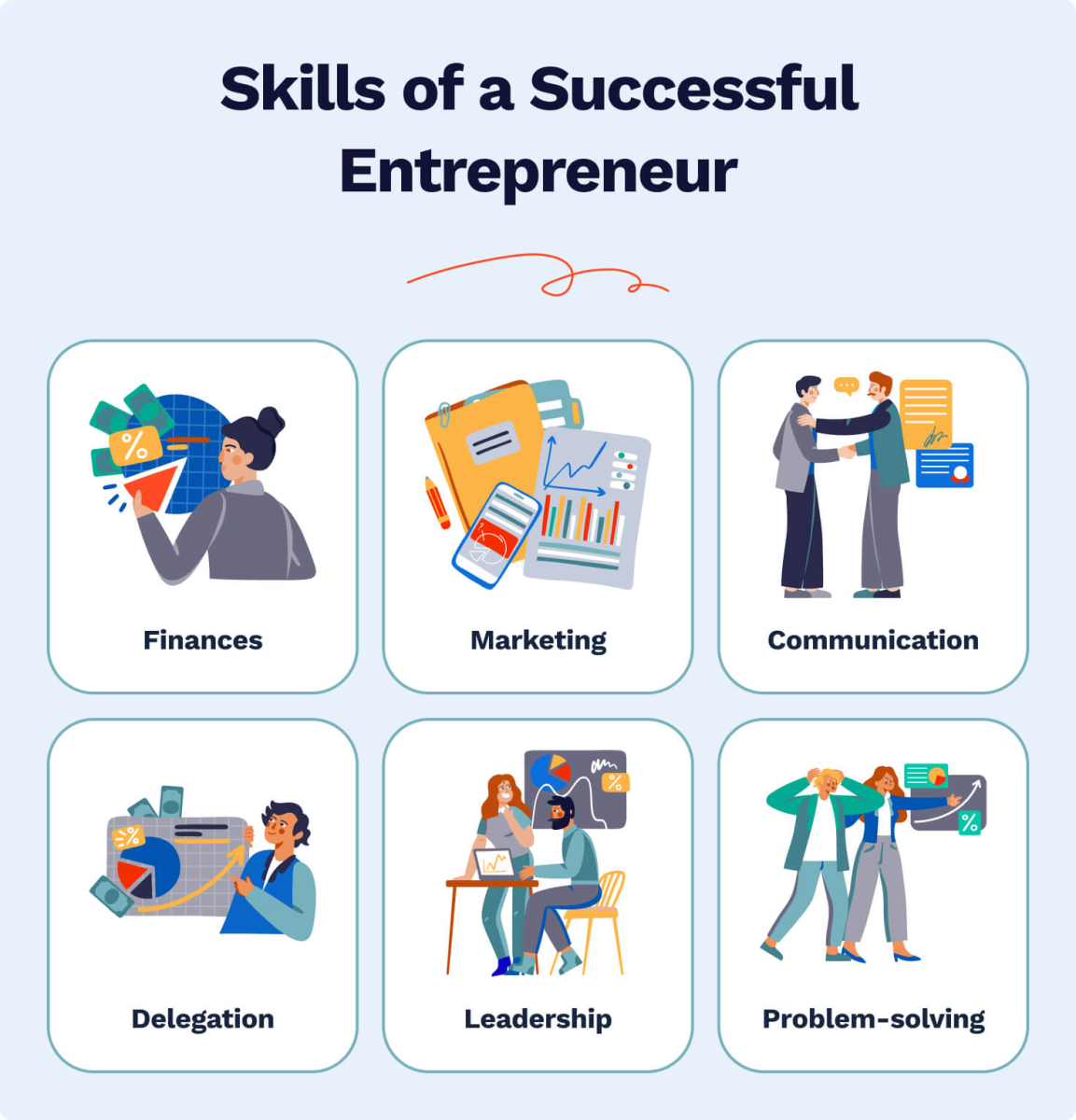
🏆 Best Ideas for a New Business [2026]
If you dream of starting your own business, you probably already have a few ideas of the direction you want to go in. Maybe you want to open up your own store or turn your hobby into a career. Regardless, we’d like to give you some more food for thought. The ideas presented here are based on our research of top business trends for 2026. Here you will find the perfect inspiration for your next venture.
So, without further ado, here are the twenty best ideas for a new business:
- Reselling Business.
In today’s day and age, it is important to think about sustainability. Reselling clothes or other items is a great environmentally conscious idea. Think of it as a part-time job that can become a primary business later. You can find great deals and discounts on the Internet to help you get started. The key is to properly analyze the market and predict what is relevant and what customers want. - Reviewer of Local Businesses.
There are hundreds of new small businesses opening up every day, and a lot of them crave exposure. You can help them out by creating a trustworthy review site aimed at local cafes, restaurants, or hotels. Users will post their thoughts, discussions, and announcements to increase the visibility of these places. Over time, more customers will become interested in your site, and cafes or hotels will want to be featured on your site. - Graphic Design Service.
Speaking of small businesses, a lot of them want to invest in developing their brand identity. You could start a website design service for freelancers and aspiring entrepreneurs. In time, your goal might be to bring customers and artists together, depending on their needs and desires. - Development Service.
Computer-savvy people are always in demand. You can learn how to code and get into website creation and design. Today, it’s an accessible science. You can take free courses, read books, or watch videos on coding. You will be demand because every business needs a website. - Relocation Service.
Nowadays, rental costs are rising and people move quite often. A relocation business suits people who find packing and lugging boxes relatively easy. You can earn money by helping people move, and you’ll even find clients on campus. - Transcribing Content Service.
We are becoming more and more aware of the need for accessibility. This is why transcription is an essential service. Transcribing videos doesn’t require much formal training or investment. Choose from different fields, such as medicine, teaching, or law. All you need is good listening skills, knowledge of grammar, and the ability to type quickly. - Meal Delivery Service.
For a lot of people these days, stopping to enjoy a meal is a luxury. Food delivery services are in demand. You can get people’s orders from local cafes or even serve your own homemade meals. Your key customers might be employees on lunch breaks or busy students around campus.
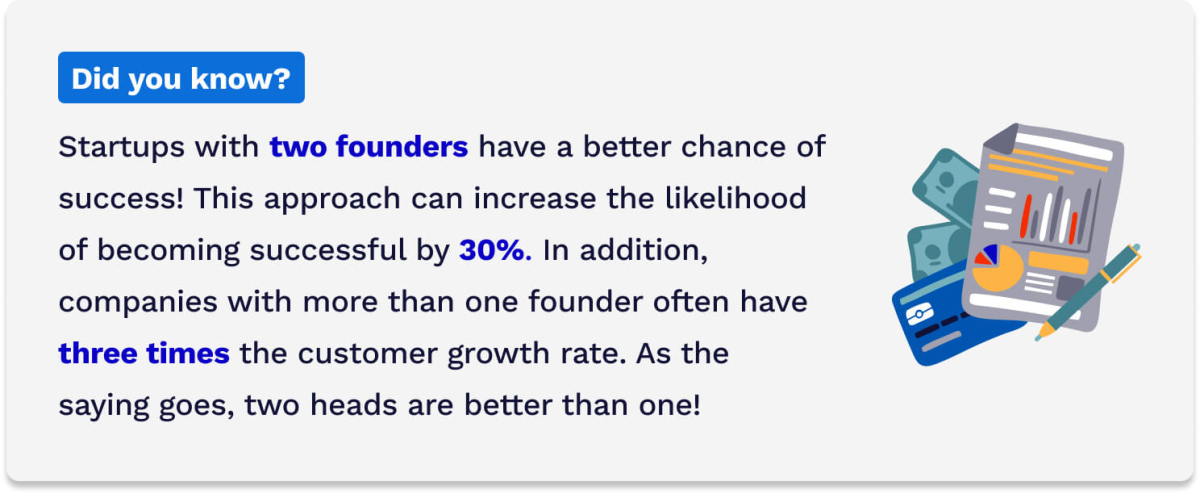
- Blog Writing.
In recent years, we’ve learned just how important it is to reach out to other people through the web. If you’re creative, active, and like to share your ideas, you can start a blog on a popular topic. There are plenty of blog creation guides for you to follow to ensure success. Your blog can be monetized through advertisement, sponsors, and audience views. - Baked Goods Business.
Are you good at making baked goods or pastries? You could try turning your skill into a business venture and make cakes, pies, and cupcakes for your peers on campus. You’ll benefit from reviews from satisfied clients and can advertise on your social networks to promote your products. - Event Planning Service.
Parties, meetings, and celebrations are a great way to make money. All you need is a solid social network and organizational skills. Try your hand at organizing events for other people and maybe you’ll find your calling! - Educational Programs and Courses.
Courses are an excellent way to monetize your knowledge and share your expertise with the world. You can try your hand at anything, from language tutoring to teaching dance. You could start your course by offering a free demo, collecting feedback, and promoting it on your socials. - Private Tutoring.
If you don’t feel comfortable hosting a course for a large number of people, you could start with something smaller. Helping other students with their studies is an excellent idea if you are good at explaining concepts to others. There are plenty of tutoring resources available online to help you create engaging lessons. - Subscription Box Service.
This is a pretty exciting way to start a business. Selling subscription packages like vitamins or beauty care products is a great business idea. Use your imagination and create a secret box or include an option for clients to decide for themselves what they want to receive each month. - Handmade Product Sales.
This business plan is best suited to creative people. You could sell handmade jewelry and accessories, knit or sew, or make original ready-made items. Start by advertising on your personal social media, and later you can even create your own website.
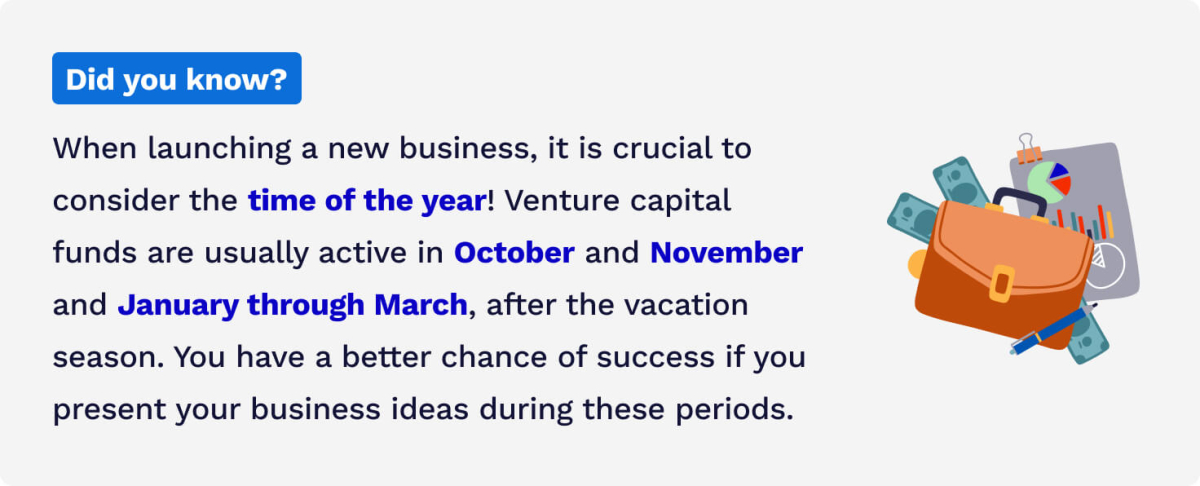
- College Admissions Consultant.
A college counselor is a person who helps students deal with financial matters, scholarships, and supporting documentation. All you need is a computer and Internet connection to help students get into college or university. This role doesn’t require a special certification but you should be well trained before beginning. - Pet Care Service.
If you love animals, options such as dog walking or pet-sitting will suit you. You could also try selling treats, clothes, and accessories for pets. - Video Reviews and Unboxing Content.
Creating content has never been easier! You can try your hand at making videos for different online platforms. These could be product reviews, vlogs, or makeovers. Once you gain popularity, you can monetize your hobby. - Catering Service for Events.
This is a great business idea for fans of the culinary arts. You’ll be able to provide quality treats for different events including, weddings, fundraisers, or parties. You will need a license, a menu, and good online advertising. - Bookkeeping Service.
You don’t need a higher education to do bookkeeping – you only need to pass a course. This is a sought-after business, as every company requires financial accounting, tax collection, and necessary documentation. Depending on your workload and desire, you’ll work for yourself or cooperate with companies. - Personal Training Service.
A personal training service is a great startup that requires you to love sport and exercise. Certification is essential for your credibility and will allow you to conduct workouts at the gym. You can get paid to help people reach their fitness goals.
👣 Starting Your Business: The First Steps
If you’ve weighed the pros and cons, you’re sure you have all the necessary skills, and you’ve chosen the perfect idea, you should start making your plan. The first steps consist of market research and writing the mission and vision statements. Here, we’ll explain how to approach each of them.
Market Research for a New Business
Market research is the process of collecting and analyzing data. Usually, this includes information about competitors, target market, and industry trends. Proper research requires you to identify and understand customer needs and preferences. Also, it’s vital to assess the competitive environment and identify opportunities and potential risks.
Market research can take many forms, including surveys, focus groups, interviews, and online research. Data from your research can be used to develop marketing strategies, product improvements, and new business opportunities.
Before you launch your startup or begin development, we advise you to answer these questions:
- How relevant will your business be in the local market? How many potential clients are present in your city? Is the market already oversaturated?
- What is overall relevance of your product or service? Where will you find your potential customer base? What is your target audience?
- What is unique about your products that will set you apart from your competitors? What are your competitors’ weaknesses and strengths, and how can you outperform them?
- How will you communicate effectively and engage with your audience? What marketing strategies will you employ? Can your business make a return on investment?
How to Conduct Market Research
Market research is critical to understanding your target audience and improving business decisions. Here we offer you a step-by-step guide for conducting efficient market research. It will also help you gain a competitive edge.

- Create Your Hypotheses.
At the hypothesis stage, you must calculate the cost of your product or service and the theoretical amount your target audience is likely to be willing to pay. Your goal is to meet consumer expectations and generate revenue. When you have developed the perfect formula for pricing, you should evaluate whether your product will meet the wants and needs of your customers. This is challenging, so your work will consist of trial and error. However, without developing hypotheses, there will be no success. - Choose a Research Methodology to Validate Hypotheses.
At this point, you need to decide how you will undertake your research. It is better to start with obtaining secondary data. You need to collect information on your competitors and compare your products and services with those on the market. After that, you can move on to primary analysis, the purpose of which is to collect data on the needs and satisfaction of consumers. You can use the results of existing surveys, questionnaires, and interviews or conduct them yourself. - Determine Your Desired Consumer.
It’s time to choose ways to attract your future clients. Of course, the most effective, relevant, and practical way is social networks. When you run an ad, you can customize it, for example, to specify the desired location and age of the consumer. In the future, word-of-mouth will also help you, with your satisfied clients talking about your business to their family and friends. - Perform Research.
You need to test your brand. You can take a small sample of people and determine how positively or negatively they rate your product. For example, it’s possible to include a list of your competitors and ask questions about their products and services. This approach will help identify your direct competitors and their strengths and weaknesses. - Gathering Results and Future Steps.
You now have all the data you need to improve your business concept and take it to the next level. You can address your shortcomings and market your products and services to your desired audience.
The Importance of Mission and Vision Statements
The mission and vision statement serve different purposes and focus on different aspects of the business. However, these two elements are vital for any business, particularly a startup.
Mission and vision statements are vital for your startup. With them you can understand where you are going, what you’re doing today, and where it will lead. These statements are also your brand’s calling card for your customers. Clients need to understand who you are and what you are about.
🔨 Constructing Your First Business Plan
A good business plan serves as the blueprint for the company’s operations. It contains the goals and strategies that will be used to achieve success. This document also provides contingency plans in case things go wrong.
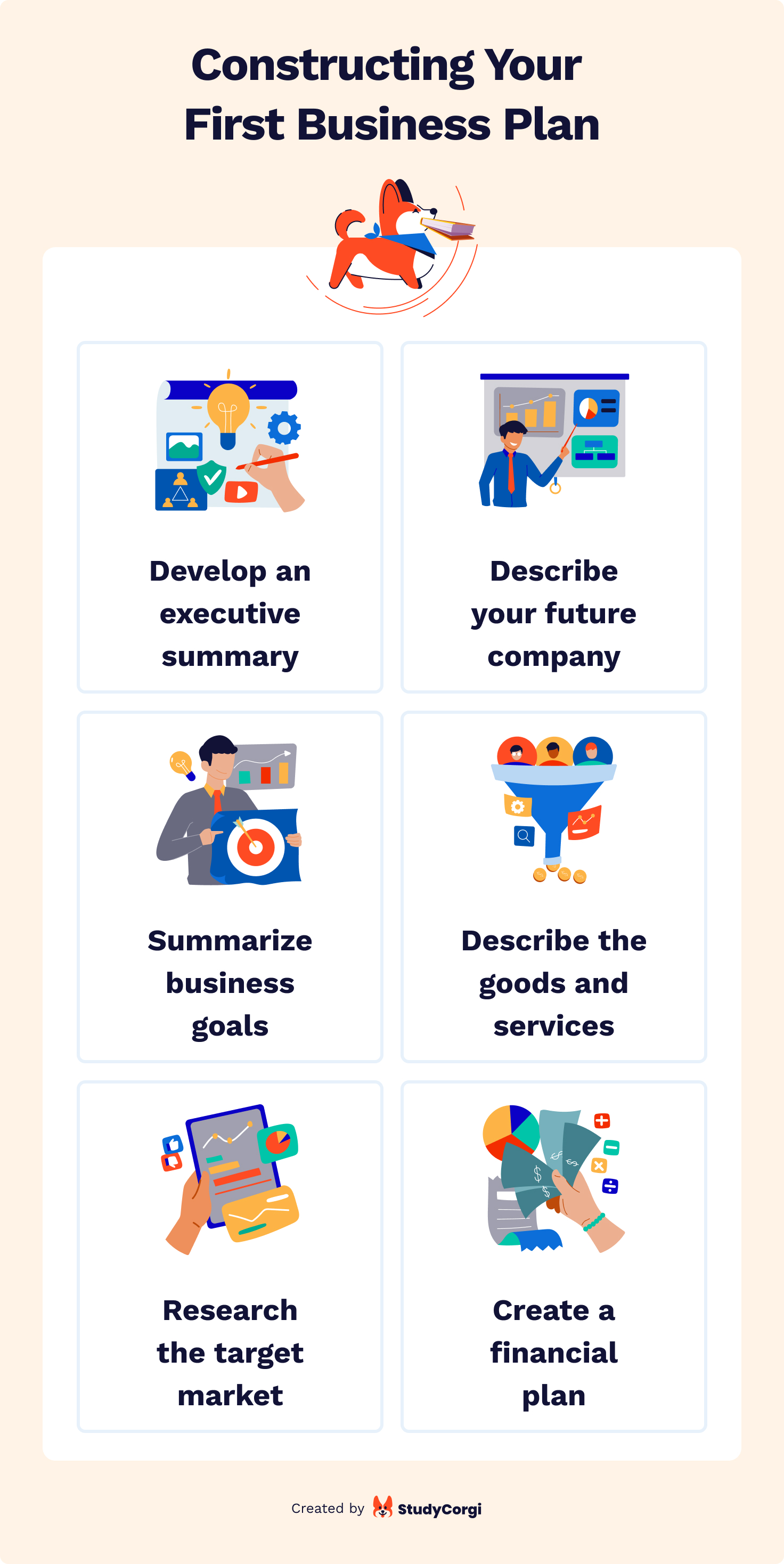
An effective business plan increases the chances of attracting investors, getting licenses and business loans. Student entrepreneurs often use this tool to develop the company concept and evaluate their strategies. A solid business strategy involves several steps. You must:
- Develop an executive summary.
This first step offers some basic facts about the business. Think of it as the pitch for investors. An executive summary includes the business’s name, the market it wishes to enter, and the goods and services it will provide. You can always look for examples online to see how other companies compile this section. - Describe the company.
Next, you should provide some specific company details. This includes the address, employees, and structure. If an enterprise is student-run, it’s likely to either be a sole proprietorship or a partnership. - Summarize business goals.
A business plan needs to articulate financial goals. Other objectives include specific engagement rates or a certain number of social media followers. It should also outline how the company will reach and satisfy its client base. - Describe the goods and services.
The document describes the products and services a business wants to produce. Students can explain how they will respond to market demands. The section may also include trademarks, patents, and visual aids. - Research the market.
This part of the plan explains the gap a company wants to fill in the market. You might compare the business to other industry players and outline your advantages over the competition. - Create a financial plan.
Finally, the document should cover the financial aspect of running the company. This includes weekly, monthly, and annual spending, in addition to marketing expenses. Remember to plan for unexpected costs too.
Determining the Legal Structure
Choosing the proper legal structure is a crucial part of business development. This framework determines several things, including the paperwork you must provide, how management will be conducted, and the tax rates you’ll pay. The structure also governs the legal processes that can be initiated against the company, such as lawsuits. Each legal structure has its benefits.
Finding Sources of Funding
Businesses that are just starting out often rely on the savings of entrepreneurs and funds from family and friends to get things going. Luckily, there are also other methods for financing your enterprise.

Registering a New Business
After you make a plan and settle on your business’ financial and legal structure, it’s time to register the enterprise officially. The registration details depend on the type of business, its size, and location. That’s why we’ve decided to only cover the basics here. If you need help or have questions, please seek legal advice.
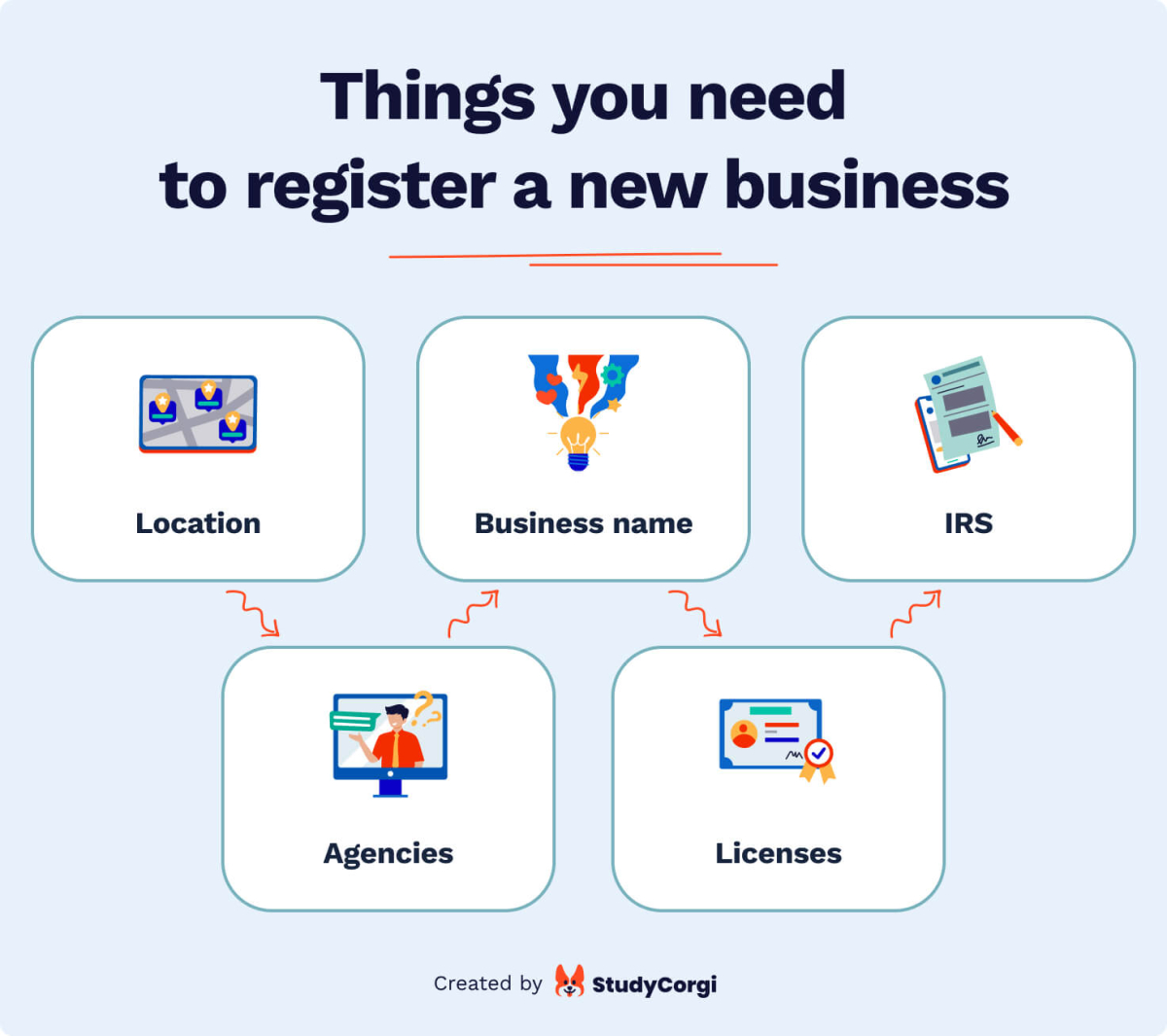
- Find a location. You need a business address to file taxes and get documents from the bank or government agencies. This might be a separate location or tied to your home address, which is the case for many student-run businesses.
- Register the business name. Second, register the name of the business. Since students mostly run single proprietorships or partnerships, many enterprises are under their own names. If you want a firm with a different name, it’s important to use a DBA (doing business as) form.
- Sign up with the IRS. Next, it’s important to register with the IRS to receive an employer identification number. This works like a social security number and is required for filing taxes. This process can be done online.
- Apply for local and state agencies. After the business is entered into the federal database, it should also be added to local and state agencies, such as revenue offices. Later on, you’ll need to register with a state agency to file payroll taxes when the business has employees.
- Apply for permits and licenses. Lastly, you need to have all the right permits and licenses required for running a business. One may find these documents on the US Small Business Administration website.
🌱 Growing Your Business
Once you register a business, it’s time to think about growing it. This part of the article will provide general advice to help beginners grow their enterprises.
- Create a structure. Your business needs to be organized to achieve success. A structure helps track things and complete tasks on time.
- Keep records. Detailed records help enterprises look at the current state of things. They also help with forecasting.
- Analyze the competition. Other companies often have something to teach newcomers. You may take advantage of existing practices and use them to increase sales.
- Evaluate risks and rewards. A business owner should always search for potential risks and the benefits of pursuing them. For example, entering a new market may be risky but bring new important clients.
- Stay creative. Good entrepreneurs need to constantly look for ways to get the upper hand on the competition. This is possible only by experimenting with various approaches and ideas.
Another important part of growing and expanding businesses is branding and advertisements. These allow businesses to reach a wider audience and find new clients.
Branding
This process allows companies to create a distinct image in the minds of customers and target audiences. Branding includes your business logo, mission statement, and visual design. A brand identity includes product quality, pricing policy, and customer service. Company websites, ads, and even color scheme are important as well.

There are several things to consider:
- Create a brand identity. For a company to stand out, it should have a distinct look and feel. A blooming business must carefully work on its values, mission, how it treats customers, etc. This involves figuring out what you want to do and who you see as your client base.
- Visualize the branding. Companies should take a close look at the visual design of their brand. The initial stage involves choosing the right font, color palette, and overall style. It should reflect what the business is all about.
- Set yourself as an expert. An enterprise with little to no funds can brand itself with a good content strategy. For example, if you want to have a shop selling custom-made shirts, it’s wise to tell people how to best take care of their clothes. This makes people more likely to remain loyal customers.
- Look for partners. New businesses can seek partnership opportunities with other brands to get a leg up. Establishing a link with different companies can lead new clients towards you.
- Be someone customers can rely on. Lastly, business owners should consider how to retain customers and their reputation. This involves putting maximum effort into customer service.
Advertisement
Small businesses often lack the funds to grow quickly or maintain operating costs, especially if those enterprises are run by cash-poor students.
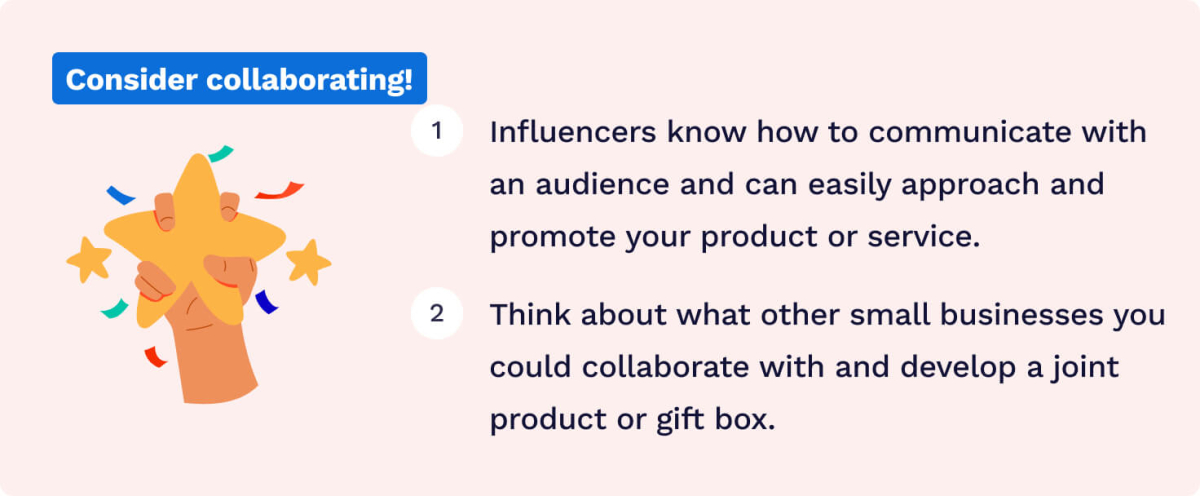
Students don’t have large advertising budgets. However, they should prioritize advertising to build awareness of their business. Many types of advertisements are cost-effective and get people talking.
- Social media. Small businesses often choose Facebook, Instagram, and LinkedIn to find customers. These platforms have great ad settings allowing entrepreneurs to narrow their audiences.
- Pay-Per-Click. PPC ads require you to pay fees each time a user clicks on your ad. These are usually displayed in search engine results. Note that if a person visits your website without clicking the ad, you’re charged nothing.
- Mobile. Mobile advertising is one of the most effective platforms for those seeking a younger client base. That’s because most US adults under 30 shop online via mobile devices.
- Print. Such ads are almost nonexistent in the modern age. The younger generation might not even know what newspapers look like. But, it may be a viable source of customers if you want to sell goods and services to older clients.
- Broadcast. Small business owners can contact local radio and TV stations. They often provide ad space for a fair price and a good communication channel with potential customers. Even a 1-minute ad during the right time of the day can get people noticing your business.
- Out-of-home. This type of advertising refers to all ads people see outside their homes. This includes transit, billboard, and sports venue ads. Students should focus on posting leaflets and other cheap ads near their place of business.
- Direct mail. While emails have been around for a while, it’s still effective. A good cold email helps establish first contact and spark interest in your enterprise.
Best Advertising Tips for a New Business
🔍 Useful Resources for Student Entrepreneurs
Here is a list of valuable resources to help you start your own business. Entrepreneurship is highly valued nowadays, so it’s easy to find programs and websites to support ambitious students. All the resources below are free, so you don’t have to worry about your budget!
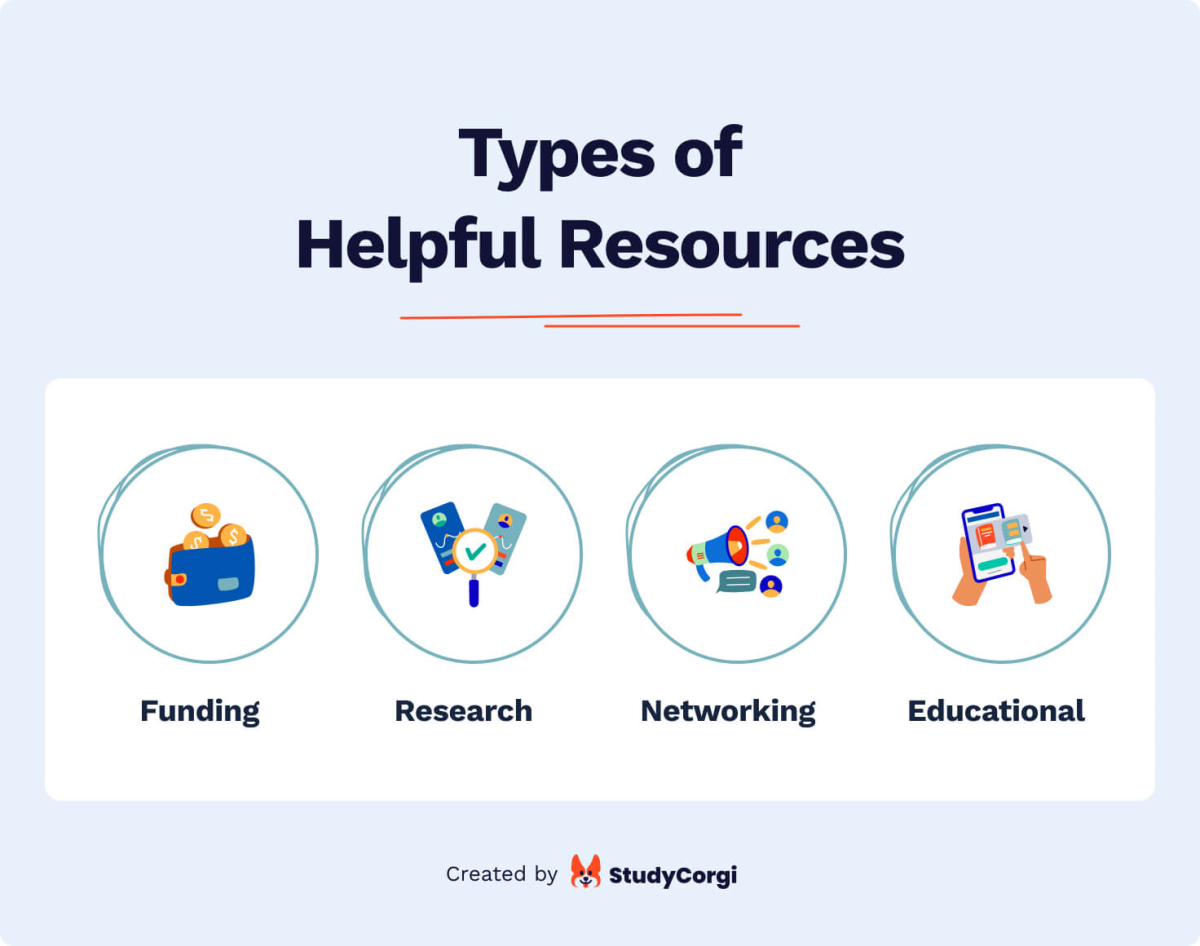
Let’s take a closer look:
Funding
Financing is one of the most essential parts of any business. It’s also one of the most problematic areas for student entrepreneurs. Fortunately, many programs and grants are ready to support you! Here are some of them:
Research
Keeping up to date with the business world benefits aspiring entrepreneurs. You have to stay on top of trends and innovations to ensure that your business is new and fresh. The following publications are free and incredibly useful for student entrepreneurs:
Networking
Whether you are looking for a business partner, an investor, or potential clients, networking is essential for a successful venture. Unfortunately, it can be challenging to make professional connections as a student. You can attend networking events, but that’s not always enough. Below we outline other networking resources:
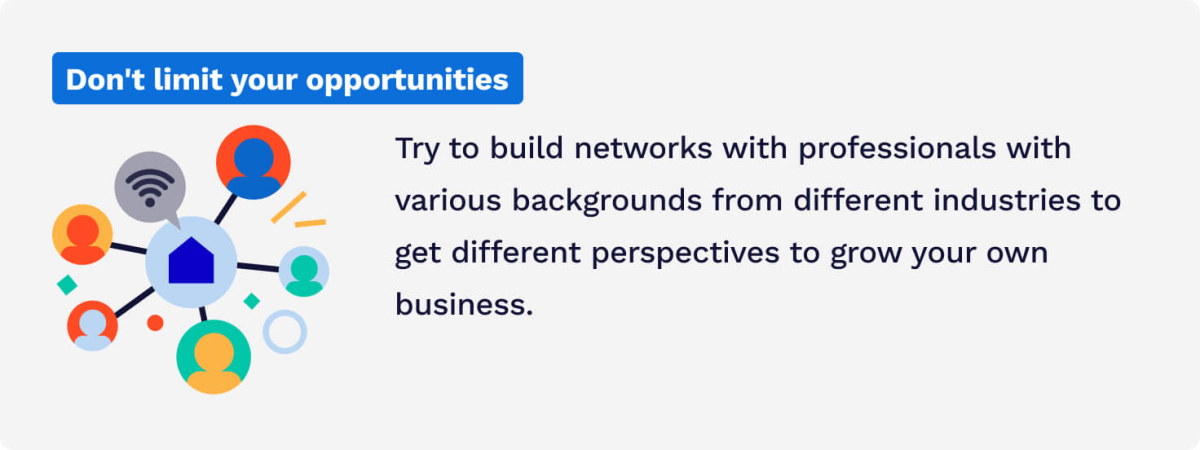
General Educational Resources
And finally, you shouldn’t forget about self-development. As a business owner, the success of your business will depend directly on you. These resources will help you gain new skills, stay sharp, and update your knowledge:
We wish you the best of luck in your new business venture and hope you benefit from our article. If your friends or fellow students want to start their own businesses too, send them this article!
